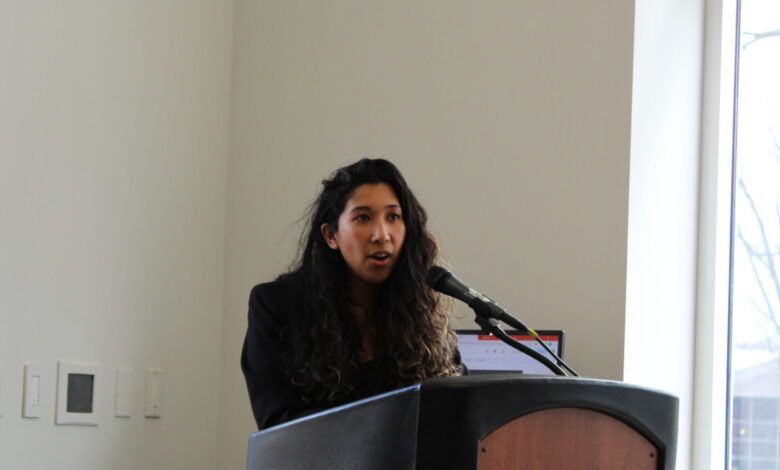
Gender and Sexuality Studies program hosts 41st Colloquium
By Shaun Chornobroff
KRISTY Drutman’s identity Browngirl Green was created during her senior year of college. Her activism has cultivated into a massive following within the environmental space, pioneering not only her own brand, but the Green Jobs Board, a company dedicated to aiding passionate environmentalists within the activism industry.
On March 28, Drutman was the keynote speaker of Rider’s 41st Gender and Sexuality Studies Colloquium, encouraging a crowd in Lynch Adler Hall 202, largely compromised of students and young people, who are a part of the generation who have the power and responsibility to reverse the climate crisis encapsulating the world.
In her speech titled, “Owning Your Environmental Story: Feminism as a Tool for Climate Justice,” Drutman talked about not only her path and efforts, but the need for more young people to use their voice to cultivate change.
“It can’t just be me, nor do I want it to be,” said Drutman. “I’m literally up here because I want all of you in your own regard because we need you.”
In addition to Drutman’s speech, panels on gender and media, historicizing sex and gender and the literary constructions of gender were held during the colloquium, which spanned from 9:45 – 6 p.m. Along with the panels, there were posters on the second floor of Lynch Adler Hall, showcasing student research into a number of categories related to gender and sexuality.
“I think in this moment where gender studies programs are being banned, potentially, LGBTQIA+ studies are under threat and the marginalized communities associated with them are threatened more than ever, this program and this colloquium is important too,” said Associate Professor and Director of Gender and Sexualities Program Erica Ryan, during the introduction of the keynote session.
Before Drutman took the stage, multiple awards were given out, including the 2023 Ziegler-Gee Award, which was given to Associate Professor Allison Weidhaas and the Virginia J. Cyrus Scholarship which was awarded to junior music production major Asha Burtin.
“It’s important for students to get an opportunity to learn about how to advocate [but] also to learn about others’ experiences in meaningful ways, and by having people talk about their experiences with gender discrimination and with sexuality discrimination, it’s an opportunity for students to learn beyond the classroom,” said Weidhaas.
Drutman opened her speech to the Rider community with a land and labor acknowledgement, shining light on how the university was built on ground that once belonged to the Lenni-Lenape tribes and that the country is built on labor of enslaved people who were forcefully brought to the country, as well as acknowledging immigrant labor.
She then did a mental grounding exercise, asking the audience to close their eyes, breathe and mentally venture to a place in nature that they really love. Drutman asked the audience to survey their mental surroundings before allowing them to open their eyes.
“When we’re talking about climate change and these really big systemic issues around environmental justice and thinking about caring for the planet, we first have to understand our disconnect from nature,” said Drutman. “A lot of us come from cultures and ancestries where we were very connected to the land and connected to the environment. Due to the economic and political systems that exist today … we’ve been separated from the land, separated from our connection with nature.”
Throughout her speech, Drutman, who is Jewish and Filipino, explained the impacts of colonization on environmental issues, and how women and minority groups are disproportionately affected by climate crises, yet are very often not given a voice in changing the current impact. Drutman said 67% of climate-related decision making is made by men.
When it comes to philanthropy, Drutman said only 2% of all philanthropy goes to anything related to climate change and that 25% of staff and only 4% of senior staff that handled funding identified as people of color.
“We bridge the climate education gap, we’re actually putting women in the roles to be leaders and adapters and actually protect the communities a lot more,” said Drutman. “Because we’re actually putting them in positions where it’s like, ‘No, I do have the degree, I do have the expertise, I’m leading my community and we’re making sure that they’re in those rooms. And that’s something that’s going to be continuously very critical.’”


